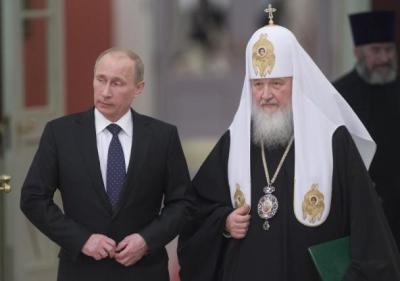The Russian Orthodox Church is complicit in the war against Ukraine

The history of the Russian Orthodox Church (ROC) is highly checkered, with moments of greatness alternating with periods of failure and corruption. Sadly, as Vladimir Putin has attacked Ukraine and created a humanitarian crisis of epic proportions, the ROC is writing another dark chapter.
While other Christian organizations have spoken out boldly against Putin’s war, the ROC has remained silent — and complicit. Their moral error is so egregious that the World Council of Churches has no real choice. Just as other global organizations have barred Russian participation, so should the Russian Orthodox Church be expelled from membership.
Before the socialist revolution of 1917, the ROC’s main priority seemed to be accumulating wealth and power rather than caring for its believers. As a result, the roofs of churches shimmered with gold. At the same time, peasants, workers and the poor in cities and throughout the country went without and even starved.
However, a generation later, when Hitler attacked, Russia had to buy weapons from the United States and Great Britain to defend itself. In response, the ROC rehabilitated its image by donating some of its gold to support the state's efforts. Consequently, following World War II, the Soviet regime, despite its general hostility to organized religion, still viewed the Church somewhat more favorably. But this alliance came at a high and profoundly corrosive price: the state's security apparatus, the KGB, penetrated all the levels and structures within the Orthodox Church.
This development had tremendous implications for the ecumenical movement. In 1961, in the middle of the Cold War, the World Council of Churches (WCC) held its Third General Assembly in New Delhi, India. At the beginning of the assembly, black limousines brought a ROC delegation from the Soviet embassy. This church delegation may have been received with great pomp by the world ecumenical movement, but sharp observers sensed something was wrong. Among the ROC delegates were agents of the KGB. These clerical spies reported back to Moscow on the activities during the assembly. They also ensured that ROC participants would be answering to a higher power — and not a divine one.
Thus, the way was opened for ROC leaders with KGB ties to attain positions within the WCC. For example, a Russian archbishop became a member of the WCC Central Committee; there is now ample evidence he was also a KGB operative. Such deep penetration of the WCC happened repeatedly, as the KGB successfully carried out its strategy to infiltrate the WCC structures thoroughly.
Not coincidentally, the WCC directed its anti-arms protests against Western weapons but said nothing about Soviet nuclear-powered missiles in Eastern and Central Europe. As Ernest Lefever of the Ethics and Public Policy Center has documented, the WCC began to provide financial support for various revolutions around this time, even helping to arm guerrillas fighting in numerous countries worldwide — although WCC leadership later stopped taking such actions.
I experienced the impact of Christian groups’ friendliness to authoritarian socialism in my home country of Czechoslovakia, which the Soviets invaded in 1968 while I was a university student. Communists infiltrated both Catholic and Protestant groups, and some pro-communist trends persisted in the Czech ecumenical movement even after the revolution of 1989. For example, after Czech church groups organized financial collections in 2006 to support persecuted Christians in Cuba, a WCC representative visited Prague's Ecumenical Council of Churches. During this visit, this person falsely claimed that a WCC delegation had recently visited Cuba without observing any persecution of local Christians.
The ROC remains influential in today's ecumenical movement, often — and successfully — demanding various concessions. Patriarch Kirill, the current ROC primate in Moscow, likes to be photographed with Putin, who has been unstinting in showing him his favor. Both seem to believe in the value of reuniting church and state. Putin makes a great show of kissing an icon in the church, and in return, he receives loud approval of his regime from ROC leadership.
The current Russian-Ukrainian war has fully revealed this horrible compact between Putin and Kirill. Furthermore, the war also has a religious dimension. The Russian Orthodox Church would like to absorb the Ukrainian Orthodox Church, which in 2019 achieved its independence from Moscow after the Ecumenical Patriarch of Istanbul recognized its autonomy. But the religious component goes far beyond Kirill’s desired reunification.
Various parties have called on Kirill to speak out against the unprovoked invasion. His previous silence implied he already tacitly supported the mad President Putin's intentions toward Ukraine. Still, his more recent comments confirmed that he not only supports Putin but also has his own motivations to justify the murderous aggression actively.
In a February 27 sermon, the Patriarch said, “God forbid that the present political situation in fraternal Ukraine so close to us should be aimed at making the evil forces that have always strived against the unity of Rus' and the Russian Church gain the upper hand.” As Paul Elie, a senior fellow of the Berkley Center for Religion, Peace, and World Affairs at Georgetown University, observes, Kirill has now explicitly cast the conflict as “a culture war — a holy war — between religious traditionalism and liberalism.”
In a rare media interview, Bartholomew of Constantinople severely rebuked Russia for waging war against coreligionists. Later, in a written statement, he demanded that Putin “immediately stop any act of violence, anything that spreads pain and death.” If the WCC cares about peace, it must not allow such behavior among its members. The ROC should not be permitted to continue as a WCC member until it turns away from this false path of religious nationalism.
Pavel Cerný is a pastor of the Church of the Brethren, a professor of the Evangelical Theological Seminary in Prague, and a former president of the Ecumenical Council of Churches in the Czech Republic.




















